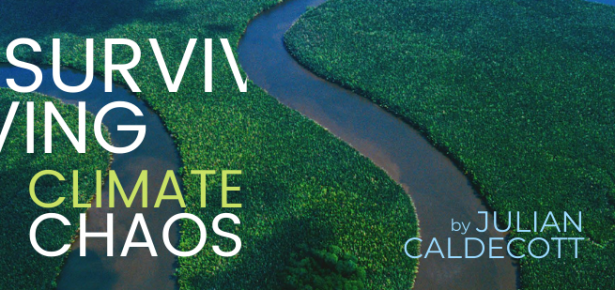
Surviving Climate Chaos is being published into a new world of lethal fires, floods and record-breaking temperatures, while the IPCC warns us that we are in the last decade before Arctic, oceanic and equatorial tipping points take all choices out of human hands. This emergency calls for far greater focus and impact in our climate change response, and for the strengthening of communities and ecosystems everywhere against climate chaos. It also calls for greater clarity in how we think about the social and ecological systems in which we live, the stresses that they experience, and how we and they adapt to new and dangerous circumstances.
“Although what we should do in practice has long been obvious in general and precautionary terms, the existence of uncertainty inevitably fed controversy, and controversy has favoured the rich and powerful who often have least interest in promoting change. The whole thing has been described as a ‘wicked’ problem, being deeply complex, intractable, and resistant to solution, but an independent observer might say that we have added to this ‘wickedness’ through unclear intentions, political naïveté, and a specious faith on our own knowledge and ability to understand and predict the behaviour of extremely complex systems.” (pages 204-205).
“The mitigation problem cannot be solved by any one country, and there is no all-knowing, global ‘hegemon with the power to impose a single set of rules’ (Chapter 1). Only nature could have that role, in wielding infinite power and universal rules, but this is seldom acknowledged. International cooperation is therefore essential, and this has fallen foul of multiple sources of reluctance to cooperate, rooted in historical, cultural and economic experiences, rivalries and reasons for distrust, ranging from slavery, trade and religion to imperialism, ideology and war. The slow and painful process of the UNFCCC and its gradual, erratic progress towards approximate agreements on fixing the mitigation problem, is the compromise solution that has gradually been squeezed out of the tension in the UN system between everyone knowing that something must be done and no one being willing to pay for it.” (page 309).
None of this is helped by ignorance. “Never before has an animal species single-handedly destabilised its own habitat at a global level, and in the process brought to a halt the evolutionary trajectories of millions of other species. We are doing this while also applying the full force of investigative and analytical technology to document and explain events and foresee outcomes, and also while in full possession of enough advanced ecological and anthropological knowledge to make sense of what we are seeing. The adaptation communications [from UNFCCC member countries to each other through the UNFCCC Secretariat] are an ever-deepening ocean of knowledge to which any student, researcher or teacher should be drawn at this, the most interesting and desperate time in human history.” (page 322).
Title: Surviving Climate Chaos by Strengthening Communities and Ecosystems
Author: Julian Caldecott
Paperback ISBN: 9781108793780
Hardback ISBN: 9781108840125
Latest Comments
Have your say!